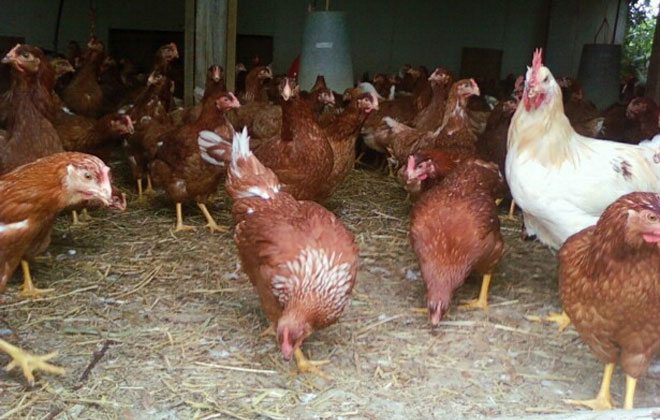When Eston Manegene gave up formal employment, he knew he would have to work hard to succeed.
Having reared chicken before, the 25-year-old was sure that with good research, best practices and great passion, he would earn more from poultry farming than his salary could ever bring him. But only if he got it right.
And so in 2013, he retreated to his home in Mutuanjogu, Kirinyaga County, to begin his life as a poultry farmer.
At about this time, a young IT graduate, frustrated that he could not get a job, was also about to return to his rural home. Banking his future on his meagre savings, Caesar Macharia, 26, went back home, built chicken coops and begun life as a farmer.
Looking back, the two friends are glad they became farmers.
To them, every penny counts. To save on money, they have improvised and fabricated home-made equipment. Since a huge chunk of their costs are swallowed up by feeds, the two produce their own feeds using locally available plants.

Manegene started off with two poultry farms — one on a vacant plot in Juja and the other on his father’s unused property holding in Kibingoti. He purchased 50 “kienyenji” chicks and bred them in Juja, buying more chicks whenever he could.
“When I have young chicks in Kibingoti, I spend my time there and leave those in Juja under the care of my workers,” he says.
He now has a flock of 980 birds from which he collects 450 eggs from 700 layers every day. Each kienyeji egg sells at Sh20 while day old chics go for Sh100.
The farmer keeps Kari Kienyenji, a cross of rainbow roosters, in addition to indigenous chicken and a dominant breed from Czech Republic. At Kibingoti, he has 200 five-week kuroiler chicks, having sold a mature flock in January. From his sales, he makes a tidy profit of Sh120,000 every month.
He is currently putting up more chicken coops in Kibingoti to accommodate 2,500 birds he ordered from the Czech Republic. Macharia started off by purchasing seven trays of eggs from the Kenya Agricultural and Livestock Research Organisation in Naivasha and handing them over to a hatchery at Kenol where he was to pay Sh21 for every egg that hatched.
About 50 per cent of the eggs did not hatch. I let the hatchery rear those that hatched for one month as I built my own coops. During transportation, 41 chicks died,” says Macharia.
At the farm, he realised that he was spending too much money on the chicken feed purchased from stores. However, when he tried out an alternative, 18 chicks died.
“I had hoped that these chicken would be my breeding stock but I was losing too many of them,” he said. With time he learnt the ropes.
United by their common zeal to breed chicken, the two friends motivate each other.
Because the area was not connected to the national electricity grid, they had to innovate to keep the chics warm. Macharia purchased an earthenware jiko and a paraffin lamp to provide heat and light.
“I spend Sh40 on charcoal every night,” he says.
With 40 breeders, Macharia says his business is moving in the right direction. He makes money every day and his profits keep soaring.
To cut on the cost of feeds, the two farmers breed worms by mixing rabbit waste with urine in a vermicomposting bin. They have also discovered an ingenious way of drawing ants which are then fed by the chics. At night, they spread out wet napier grass and this attracts these ants.
“We also feed them on weeds which is freely available throughout the year. This minimises cannibalism,” says Manegene.
Macharia releases his chicken to roam the compound as they browse for food. The chicken feed he has purchased is only used to supplement this diet. He rears rabbits alongside the chicken.
The young farmer says he is working to increase his flock to 1,000 and introduce dairy cows to his farm.
Manegene makes feeding troughs from used and discarded paint tins. From each such improvised feeders, he saves Sh480. In partnership with other young farmers, they formed a group, Young Achievers, and this has provided them with a forum to discuss innovations in agriculture.
Manegene says the group seeks to maximise returns on poultry and rabbit farming by using modern technology to lower the cost of feeds and equipment.
They carry out continuous research on how to find a ready market for their produce.









